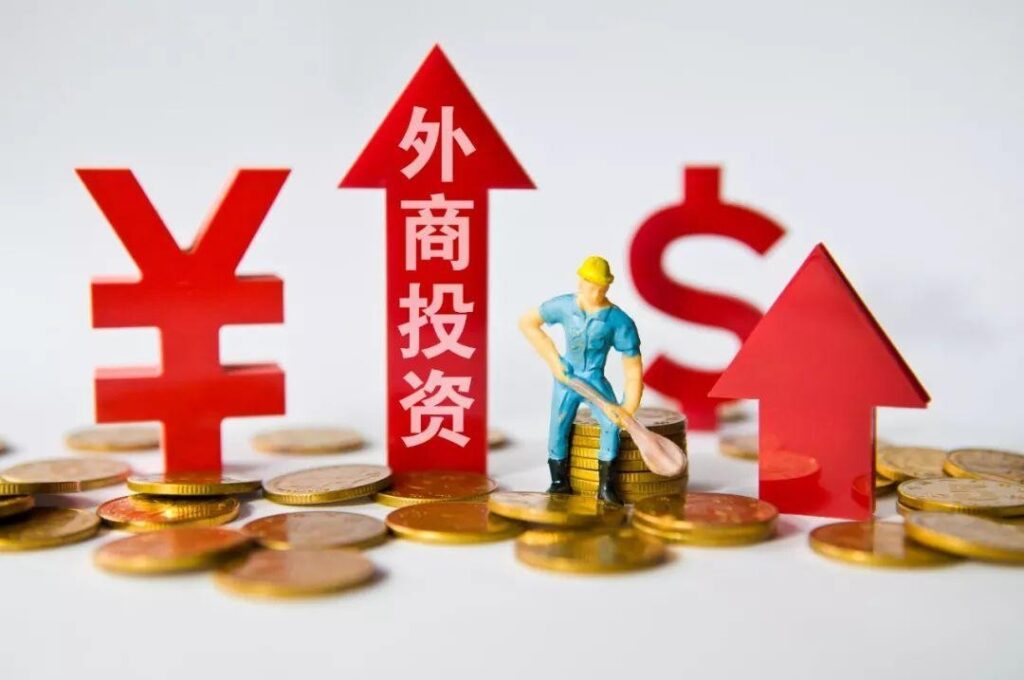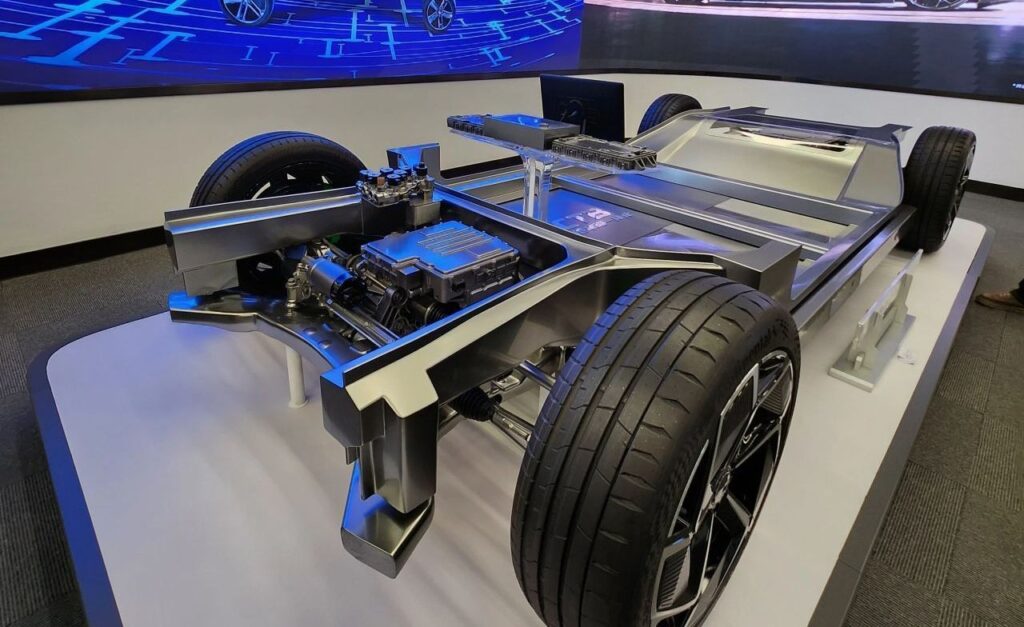- Hot topics: FDI dropped to a 30-year low but China remains an attractive market. Why? What advanced clean tech UK have that China needs? A closer look at the EV market in the UK and China, and why Nvidia names Huawei as a top competitor.
- Sector Insight – EV in China and the UK, a tale of two markets
- Client’s success – How has Cambridge Mechatronics made it in China?
- Events and good-to-know …
Hot topics

➡️ FDI into China fell to a 30-year low in 2023, an 82% decline from 2022, according to the latest data by the State Administration of Foreign Exchange. It’s widely believed that China has a difficult year ahead, its economy struggling while tackling property crisis, weak consumer demand, low investor confidence, high unemployment, a trade war with the US, geopolitical uncertainties, and anxieties caused by tougher security measures aimed at threats from outside. In the meantime, Chinese overseas M&A fell sharply due to a combination of economic and political reasons, and Chinese are buying fewer industrial companies but more high-tech businesses, according to an EY report. Still, official statistics show foreign investment in certain industries has seen double-digit growth year-on-year, notably in medical equipment and instrument, electronics, and communication equipment manufacturing, China Briefing says. And China remains one of the world’s largest consumer markets, its unparalleled supply chains won’t be easily replaced, and it ‘still presents high-value opportunities for informed executives’, it says.
 ➡️ Climate is an area to watch. According to a recent study, the UK has exactly what China needs in the clean tech area, a lot of them, creating a huge space for investment and cooperation. China and the UK share a goal: net-zero emissions in 2050 and carbon neutrality in 2060. This gives birth to a space for cooperation, a new industry called CCUS (carbon capture, utilization and storage). Some key points of the report prepared by the UK-China(Guangdong) CCUS Centre in association with other organisations:
➡️ Climate is an area to watch. According to a recent study, the UK has exactly what China needs in the clean tech area, a lot of them, creating a huge space for investment and cooperation. China and the UK share a goal: net-zero emissions in 2050 and carbon neutrality in 2060. This gives birth to a space for cooperation, a new industry called CCUS (carbon capture, utilization and storage). Some key points of the report prepared by the UK-China(Guangdong) CCUS Centre in association with other organisations:
- China currently has about 100 CCUS projects spanning different stages, offering a window for the deployment of CCUS technology between 2025 and 2035. Its carbon capture capacity needs to drastically expand, from 4 Mt per year to 2100-2500 Mt per year.
- The UK has significant advantages in many aspects of the CCUS field, including engineering consulting, project development, project financing and the supply of key components. And the government has plans to invest £20 billion in the early development of this field.
- The UK has some advanced technology that China needs in carbon capture and heat exchanger, pipeline design, material technology and offshore CO2 storage to achieve its net-zero goals on time.
- The Chinese government encourages foreign investment and cooperation in clean energy and climate technology areas.
 ➡️ Nvidia stock jumped 16.4% after the artificial intelligence (AI) chip leader turned in another blockbuster quarterly report, putting the company’s value at $2 trillion. Suddenly everybody is talking about Nvidia and AI, from the Economist to Daily Mail, from concerns of a GPU Cartel taking shape to the value of Nvidia CEO Jensen Huang’s family house, from the relationship between Nvidia and the so-called ‘AI revolution’, to its relation with Huawei and China market. Two pieces of news caught our attention: Nvidia calls Huawei its top competitor, and it has developed alternative data centre products for the China market that don’t need export licenses. CNN quoted Huang as saying that Huawei is ‘a competitor in four out of five major categories of its business, including key components for generative AI. Separately, the alternative data centre products Nvidia said it developed for the Chinese market to avoid the curse of export licenses may give some inspiration to UK tech firms. Here are more headlines that may help you ‘get it’:
➡️ Nvidia stock jumped 16.4% after the artificial intelligence (AI) chip leader turned in another blockbuster quarterly report, putting the company’s value at $2 trillion. Suddenly everybody is talking about Nvidia and AI, from the Economist to Daily Mail, from concerns of a GPU Cartel taking shape to the value of Nvidia CEO Jensen Huang’s family house, from the relationship between Nvidia and the so-called ‘AI revolution’, to its relation with Huawei and China market. Two pieces of news caught our attention: Nvidia calls Huawei its top competitor, and it has developed alternative data centre products for the China market that don’t need export licenses. CNN quoted Huang as saying that Huawei is ‘a competitor in four out of five major categories of its business, including key components for generative AI. Separately, the alternative data centre products Nvidia said it developed for the Chinese market to avoid the curse of export licenses may give some inspiration to UK tech firms. Here are more headlines that may help you ‘get it’:
- AI boom catapults Nvidia into tech’s big league
- Why do Nvidia’s chips dominate the AI market?
- TechScape: With its trillion-dollar valuation, will Nvidia’s reign last? | The Guardian
Sector Insights –
EV in China and the UK, a tale of two markets

So AI and EV have been two of the hottest words on earth for weeks if not months. In the latest development, Apple announced it’s out of the choppy waters of developing EVs. Bloomberg says is good and bad news for other EV makers. In any case, it’s hard to keep China out of the EV picture. So we took a closer look at the EV market in China and the UK, to explore the trends and potential opportunities for cross-border business cooperation in this sphere. What advantages does China have in EV manufacturing? And the market condition? What about those notable Chinese EV makers? We also turn to the UK to examine the regulations, market trends, and possible areas of UK-China cooperation in the EV sector. Read more here. Also, read about a recent visit to BYD by Ting Zhang, Crayfish.io Founder & CEO. Further reading:
- China’s EV suppliers look to leverage superior tech to recouple with West and drive expansion
- UK considers probe of Chinese EV subsidies
- China’s EV takeover – Inside Beijing’s grand plan to dominate the future of electric cars
Client’s success story –
The story of Cambridge Mechatronics Ltd, from a startup with one product to a world leader in a niche market and two offices in China
What does it take for UK technology companies to succeed in China? Ting Zhang, Crayfish.io Founder and CEO has been putting this question to some UK business executives on camera. The ‘Succeeding in China – Conversation with Ting Zhang’ video interview series aims to share some insights, reflections and practical advice through real stories of UK technology companies that have managed to enter and expand in China successfully. In the first of the series, Andrew Bickley, co-managing Director of Cambridge Mechatronics Ltd, a world leader in compact SMA actuator and control solutions, shares his company’s China success story, the learnings, and reflections on the challenges along the way in the past 10 years.

Finally…
➡️ Join us on Thursday, 14 March, online or in person, for two thought-provoking panel discussions on the healthcare sector in China and the UK.

We will look at the following:
- What opportunities are available in the UK healthcare sector for overseas investors?
- What are Asian investors, especially PE, looking for in the UK?
- What does the Chinese healthcare industry investment landscape look like?
- How do overseas businesses get there and what should they expect regarding market conditions, rules and regulations, legal matters, and practicalities?
- Case study – how a UK biotech company has made its way to success in China
All the above and more subjects during this themed event. Register here.
➡️The first-ever cellular therapy for solid tumours has been approved for the treatment of advanced melanoma by the FDA. The therapy, called lifileucel, is a type of immunotherapy which involves harnessing the patient’s own immune system to fight cancer. The research programme is led by Dr Andrew Furness, a Consultant Medical Oncologist at The Royal Marsden. To the UK scientific and medical circles it’s thrilling news, but to patients, it means better hope for life.
➡️ Mobile World Congress ( MWC) 2024 in Barcelona focuses on the future, a future of ‘intelligent, connected ecosystems’ built on the convergence of AI and IoT. The event runs from Feb 26-29, showcasing AI’s transformative power and pivotal role in evolving mobile devices beyond traditional uses. The organiser describes it as a significant milestone in mobile technology. We noticed our old friends from Cambridge Mechatronics Ltd were there, showcasing their technology. Theirs is a critical piece in that AI-powered future ecosystem.
➡️ If you happen to be around or are keen to be part of the action, the Chinese Ministry of Commerce, or MOFCOM, invites global CEOs to this event – Invest in China Summit 2024 – at the China National Convention Center in Beijing. It’s the first of the Invest in China 2024 series of events organised by MOFCOM.

